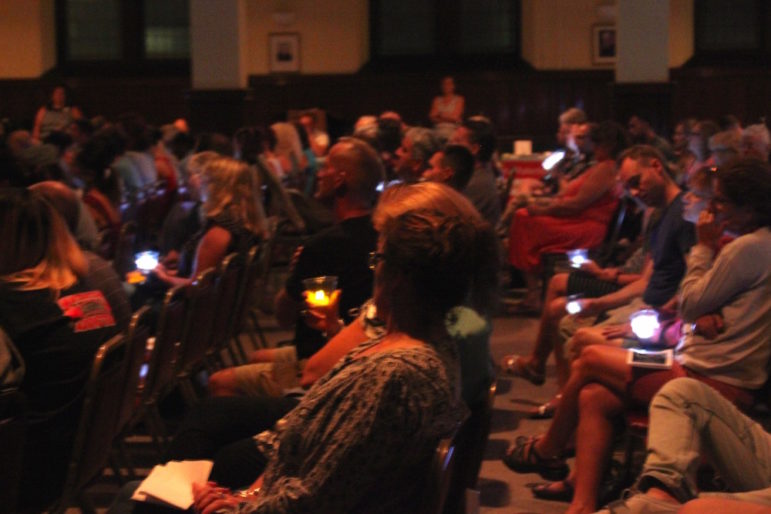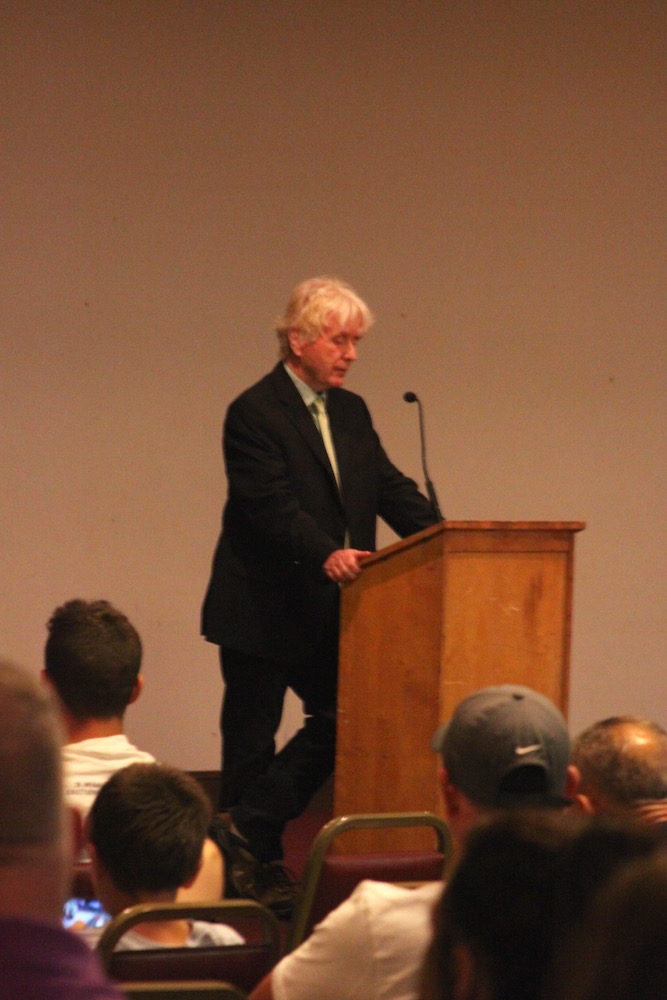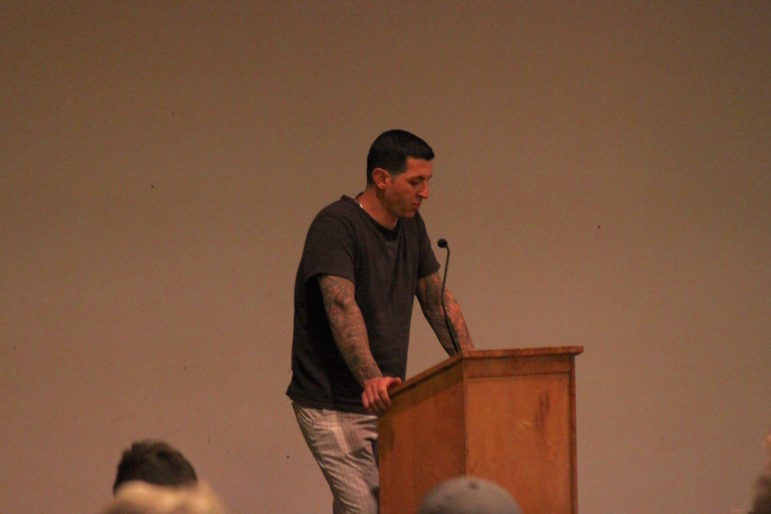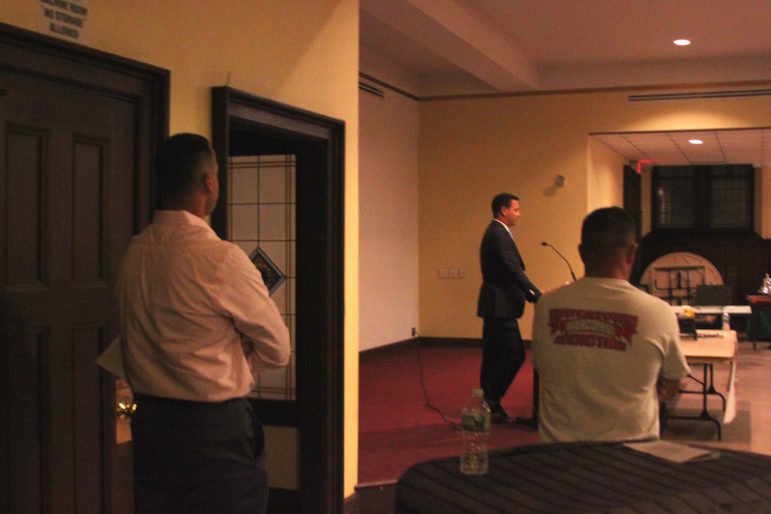
Charlie Breitrose
People hold candles to remember those lost to substance use during the third annual Watertown Overcoming Addiction Candlelight Vigil at St. Patrick’s Church.
For the third straight year, a group trying to end the plague of opioid addiction held a candlelight vigil for the family and friends of those who have lost people to their substance use including several more Watertown residents who died this year.
Pete Airasian, a recovering addict who helped start Watertown Overcoming Addiction with Wendy Clark Morrissey (who lost her brother to opioids), said he was grateful for the big crowd in the lower hall at St. Patrick’s Church Wednesday night. The losses, however, are tough.
“It is sad, but they always say it gets worse before it gets better,” Airasian said. “There were over 2,000 deaths in Massachusetts last year, and Watertown has had nine so far this year and we still have three months to go.”
The night concluded with the reading of names of those who died from their substance use, followed by a slideshow of dozens who have been lost. Before that, four people who have been touched directly or indirectly by addiction spoke about their experiences.
Jimmy Sutherland grew up in Watertown and his family has a long history in town – going back to his grandfather – but his family also has a history of addiction. Sutherland said he began drinking when he was young and when he was 15 he got kicked out of the house because he was out of control.
“I did what I wanted, I would go where I wanted. I was a self-loathing riot,” Sutherland said.
He frequently had run ins with Watertown Police officers, in which he “met” the their sticks and fists. In 1969 he went into the Army and was sent to Vietnam.
“When I was over there I learned a lot of things, and I came out of there with an opium habit,” Sutherland said.

Charlie Breitrose
Watertown’s Jimmy Sutherland recalled how addiction sent his life into a tailspin for years, but now he is clean and helps other recover.
He was engaged to be married when he got back to the United States, but instead his life went out of control. Still in the Army, he was demoted numerous times and ended up in the Stockade at Ft. Benning. Then he returned to his hometown, but continued to struggle.
“I moved across the street from here,” Sutherland said. “On a park bench (at Saltonstall Park) right out front is where you could find me. I spent 7 years in the park.”
Thinking back, Sutherland said the worst part was what he did to his parents, brother and two sisters.
“They did not deserve it,” he said. “For 7 years my father could not drive through Watertown Square because I was there – he grew up here.”
Sutherland got clean and has stayed that way for most of the last 30 years. He has started groups for addicts at St. John’s Armenian Church and at Church of the Good Shepherd that still meet. Among the people who credit Sutherland for their sobriety is Airasian.
Another person who helped Airasian find recovery was his friend Luther Halwadjian.
“If he wasn’t around when I was coming around, I am not sure it would have stuck,” Airasian said. “We went to meetings together.”
Halwadjian said that he does not have some sad story behind how he got into opioids, adding that he had a perfect upbringing. He started drinking early and then began to smoke marijuana. He said he always had a limit which he told himself he would not go beyond, things he would never do, but even though he said he would never sniff cocaine he did so before he got out of high school.

Charlie Breitrose
Luther Halwadjian said he had a perfect upbringing but was still consumed by addiction. He has now been clean for more than six years.
Eventually he did the one thing he said he would absolutely never do – take drugs with a needle. He learned that addiction does not discriminate.
“It doesn’t care if you are rich or poor, black or white. It wants you dead,” Halwadjian said.
A wakeup call came when he was living in a small studio apartment and realized it was his niece’s birthday. Despite feeling awful, he was determined to get to the birthday party, but he just could not.
“The door wouldn’t open,” he said. “It was like a vault door.”
In June, Halwadjian marked 6 years of sobriety, so he does not miss important family events any more.
He hopes that the stigma that people facing substance addiction are bad people is fading, but he recently saw a video on Facebook from a guy saying that “it was a choice,” and “no one has to do drugs.” And, many people agreed with the video in the comments.
“I was mad when I saw it,” Halwadjian said. “I was not mad for me. I was mad for the addict out there still using. Videos like that are two steps back.”
Understanding what a substance user is going through can be very difficult, as Airasian’s brothers John and Bob can attest.
John lived with Pete for four years when he was using and those years tested not only the brothers’ relationship but John’s relationships with his friends and his then girlfriend and now wife.
John recalled driving around town looking for Pete’s car if he had not returned by 2 a.m. He worried about Pete even when he was home.
“If you don’t hear them, the are not there,” John said. “I would listen at the door to hear Pete breathing. I did that every night.”

Charlie Breitrose
The Airasian brothers recalled what it was like living with someone addicted to opioids. John (at the podium) and Bob, left, remember the worry and the questions they had about their brother Pete, right, when he was using.
Bob said that he now understands what Pete was going through, but at the time he had thoughts that he said he now feels guilty about.
“I would think: why is he doing this to our parents? Is he selfish? He will never be right,” Bob said. “Look at him tonight. He is one of the most giving guys.”
Bob said there is good and bad news in the fight against opioids. The bad news is the problem has gotten worse over the past few years, but the good news is there are groups and efforts like the one in Watertown looking to help people get clean, remove the stigma and treat the disease from which they are suffering.
“Never give up on an addict,” Pete said. “The memories of the people we lost, that’s why we never give up on someone, even in their darkest moments.”
Several local organizations attended the vigil and had information for substance users and their loved ones. One group, W.A.T.E.R.town Cares, has links to local groups that can help people.
Representatives of the Cambridge Needle Exchange also attended the vigil, and provided training for how to administer Narcan, an anti-overdose drug.
